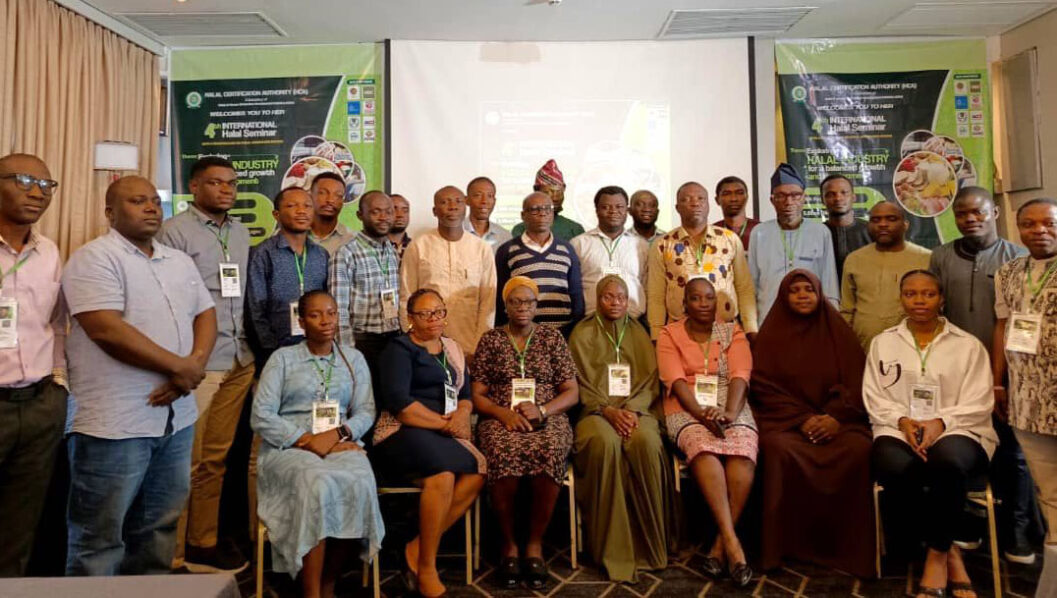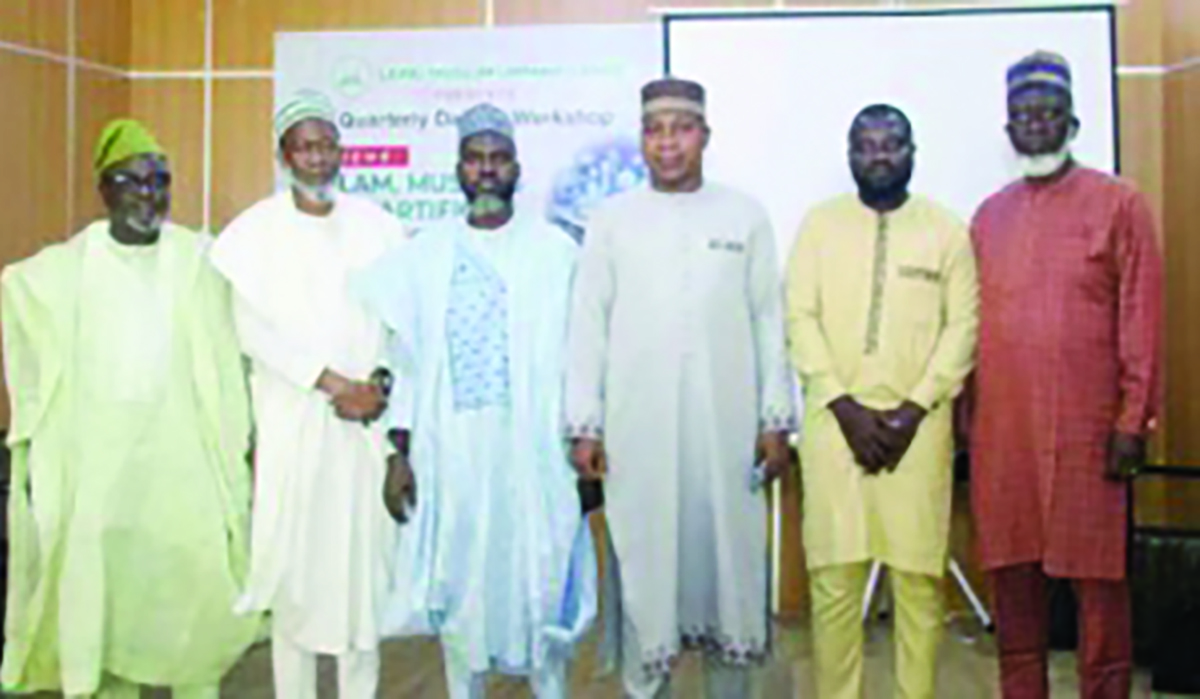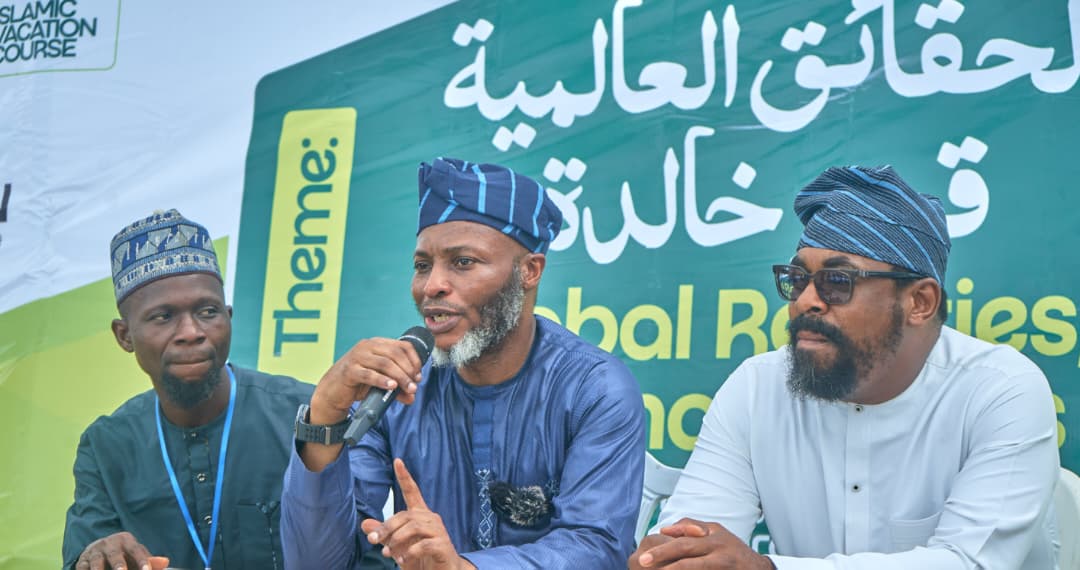 Professor of Islamic Jurisprudence at the University of Abuja (UNIABUJA), Luqman Zakariyah, has urged the current Minister of Industry, Trade and Investment, Dr. Doris Nkiruka Uzoka-Anite, to revisit the report and activities of the Technical Committee on the Development of a Roadmap and Operational Framework for Halal Certification in Nigeria.
Professor of Islamic Jurisprudence at the University of Abuja (UNIABUJA), Luqman Zakariyah, has urged the current Minister of Industry, Trade and Investment, Dr. Doris Nkiruka Uzoka-Anite, to revisit the report and activities of the Technical Committee on the Development of a Roadmap and Operational Framework for Halal Certification in Nigeria.
The Don said the revisit becomes necessary as Nigeria’s halal ecosystem continues to evolve significantly, gaining acceptance from both Muslims and non-Muslims for its effectiveness and wide range of benefits.
Zakariyah made this statement during International Halal Seminar organised by the Halal Certification Authority (HCA) at Radisson Hotel, Ikeja, Lagos Themed: ‘Exploring Halal Industry for a balanced growth and development’, the one-day event brought together important stakeholders in the halal industry both within and outside Nigeria.
He lamented that lack of full government intervention in regulating and authenticating the halal industry in Nigeria has left many local manufacturers with no clear directions, especially in terms of certifying their products with halal authorization.
Prof Zakariyah recalled that former Minister of State for Industry, Trade and Investment, Ambassador Mariam Yalwaji Katagum, commissioned the technical committee to harness the immense opportunities in the global halal market for Nigeria.
“There are more efforts expected from the Federal Government on standardization of the halal industry in Nigeria. This issue has gone beyond religious stride. It has become economic, social and wellness affairs. The effort of the Technical Committee established by the former Minister of State for Industry, Trade and Investment needs to be revisited and implemented. Such effort should not go in vain.
According to him, Nigeria is well-positioned to become the halal hub of Africa if government works with major stakeholders to increase halal certification.
Speaking on the topic, ‘Halal Procurement Procedure: (HPP): The Nigeria Outlook to the Global Demand,’ he said it is only the Shari’ah Procurement Procedure that can serve as a viable option because other procedures are not clear of inaccuracies.
“The term halal encompasses everything Muslims’ concerns. Anything forbidden or prohibited in Islamic law is referred to as haram (Khan et al., 2019). Halal include not only consumables, services and products but also dealings with clients in commerce, trades, and finances. Muslims must ensure that the halal rules of conducts are observed in every instance of their lives.
“Halal procurement involves activities like supplier management, quality checks, and ensuring compliance with Shariah practices. Establishing a halal procurement procedure is essential to align purchasing activities with Shariah practices. Supplier management is crucial in the development of halal procurement practices. The integration, evaluation, and selection of suppliers are key activities in halal procurement.”
The keynote speaker encouraged private stakeholders to ramp up awareness activities on halal, noting public awareness is still low in Nigeria. Also speaking at the event, Dr. Dahiru Adamu, a lecturer at Bayero University, Kano (BUK) and biomedical consultant asserts that Nigeria still has a long way to go in terms of certification in the Halal industry.
He said: “Nigeria’s fair share in the global Halal market is infinitesimal. We are not where we are supposed to be and that is because there is no infrastructure for Halal Certification within the country. We have facilities for every other thing, we have little or no resources and facility for Halal Certification.
“If you consider what we are endowed with in Nigeria, it is really enormous, so, if we can get things right, in respect to the Halal industry, it is going to be a plus for us. Our government needs to provide the Halal industry with infrastructural facilities.
“When we say Halal Certification infrastructure, we are talking about the technical policies and laws put together to regulate the industry, ensure harmony and prevent conflict. It also involves conformity, training of assessors and standards on which certification will be based. We should also collaborate to ensure the attainment of set goals. All these put together translate to infrastructure in this context.”
He noted that Nigeria needs to tap into the prosperous Halal industry to further boost her economic growth. However, he expressed concerns on security and other problems facing the country.
Earlier in his welcome address, Chairman Management Team, Halal Certification Authority, Prof. Ibrahim Oreagba stressed the huge opportunities in the halal industry, saying, “The global halal industry as a whole is estimated to be worth around USD2.47 trillion (excluding Islamic finance) and is now one of the fastest-growing markets. Such expansion of the industry is because the global halal market of over 2 billion Muslims is no longer confined to Muslims only.
“Similarly, the halal industry is no longer confined to food and food-related products, but rather includes pharmaceuticals, cosmetics, health products, toiletries, and medical devices as well as service sector components such as hospitality, logistics, marketing, print and electronic media, packaging, branding, and financing. Hence, the theme is very apt at this point to explore the numerous opportunities inherent in adopting a halal lifestyle.”
Prof. Oreagba went further to highlight some milestones of HCA since establishment, including the certification of over 80 local and international clients; recognition by the Malaysian Halal Council (JAKIM) and the Halal Accreditation Agency Turkiye; serving as a founding member of the National Technical Committee on the Development of a Roadmap and Operational Framework for Halal Certification in Nigeria under the Ministry of Industry, Trade and Investment in November 2021; among others.
He listed HCA’s partnerships to include the Federal Institute of Industrial Research Oshodi (FIIRO), the National Agency for Food and Drug Administration and Control (NAFDAC), the Standards Organization of Nigeria (SON), Nigerian Institute of Food Science and Technology (NIFST), Abuja Chamber of Commerce (ACCI), Lagos State Government Ministry of Finance and Ministry of Agriculture.
“Our international partners include the Halal Food Authority (HFA) United Kingdom, the International Institute for Halal Research and Training (INHART) Malaysia, and the Halal Industry Development Corporation, Malaysia (HDC).”
Prof. Oreagba charged participants to make the best out of the opportunities presented by the international seminar, while thanking the chairman of occasion, organising committee and the HCA boards for their contributions to the success of the programme.
On his part, Chairman of the Occasion and
MD/CEO, Rite Foods Limited, Mr. Seleem Adegunwa who presided over the seminar as chairman, commended HCA for championing the entrenchment of product quality in line with Shari’a and international standards, noting that it has contributed greatly to the growth of halal market in Nigeria.
“As a key stakeholder in the Nigerian food and beverages industry, Rite Foods Ltd. is poised to support any genuine attempts at enhancing quality assurance and development of Halal market in Nigeria and it is important to mention that Rite Foods Ltd. got Halal certification on the 7th of February 2022. We assure you of our supports towards the actualisation of your lofty aims which are aimed at developing and establishing halal products standards in conformity with Islamic Law and international standards.”
Halal Certification Authority (HCA) Analyst, Hajia Kabirat Oyinlola Ajani, said the 2024 edition of the International Halal Seminar is a departure from previous ones because it is interactive and company-oriented. She said participating companies are some of the first set of brands to embrace halal certification in Nigeria.
“The difference between this year’s edition and the previous ones is that this is company-oriented. We’re here to fulfil their demands and that’s why we have a masterclass session. As you can see, it’s an interactive session in which clients are allowed to ask questions regarding their respective industries and businesses. They inquire to improve productivity and promote halal output and services.” Executive Director of Zakat and Sadaqat Foundation, Prince Sulaiman Olagunju said the experience at the event has been nothing short of interesting.
“However, I feel the topic of discourse is a matter that affects all, so, it should not be seen as Muslim affairs. Halal Industry is for everyone. It centers on our ways of life, what we consumed and how to ensure that it is beneficial to us, rather than harmful. So, everyone should be involved.” He also used the opportunity to remind business owners that refusal to pay zakat from any form of wealth is detrimental.
“So, business owners should attach due importance to Zakat. Their compliance will in turn facilitate the establishment of more companies, creation of more jobs and the attainment of a saner society for everyone to thrive.”






